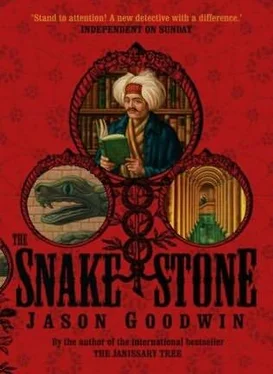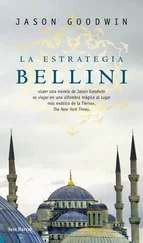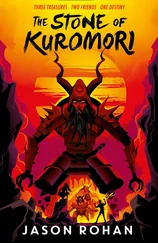Jason Goodwin - The snake stone
Здесь есть возможность читать онлайн «Jason Goodwin - The snake stone» весь текст электронной книги совершенно бесплатно (целиком полную версию без сокращений). В некоторых случаях можно слушать аудио, скачать через торрент в формате fb2 и присутствует краткое содержание. Жанр: Исторический детектив, на английском языке. Описание произведения, (предисловие) а так же отзывы посетителей доступны на портале библиотеки ЛибКат.
- Название:The snake stone
- Автор:
- Жанр:
- Год:неизвестен
- ISBN:нет данных
- Рейтинг книги:4 / 5. Голосов: 1
-
Избранное:Добавить в избранное
- Отзывы:
-
Ваша оценка:
- 80
- 1
- 2
- 3
- 4
- 5
The snake stone: краткое содержание, описание и аннотация
Предлагаем к чтению аннотацию, описание, краткое содержание или предисловие (зависит от того, что написал сам автор книги «The snake stone»). Если вы не нашли необходимую информацию о книге — напишите в комментариях, мы постараемся отыскать её.
The snake stone — читать онлайн бесплатно полную книгу (весь текст) целиком
Ниже представлен текст книги, разбитый по страницам. Система сохранения места последней прочитанной страницы, позволяет с удобством читать онлайн бесплатно книгу «The snake stone», без необходимости каждый раз заново искать на чём Вы остановились. Поставьте закладку, и сможете в любой момент перейти на страницу, на которой закончили чтение.
Интервал:
Закладка:
The naziry settled himself on the carpet, crossing his legs beneath him, and watched the men draw the lamb out of the tandir. Beyond, the sunlight glittered on the surface of the bent; frogs croaked in the reeds; swallows skimmed the water and rose twittering and whistling into the air. A servant picked up a silver tray and polished it carefully with a cloth. The cook nodded.
He arranged a mound of pilaf on the tray, then took the long knife hanging at his belt and began to carve the meat.
A horseman rode up the track and out of the trees. At the sight of the tent and the smoking meat, he reined in and bowed from the saddle.
The sou naziry raised a hand in greeting.
“May you eat well, efendi,” the stranger said politely.
The naziry hesitated. There was something familiar about the rider: he had an impression that they had met, but he could not remember where.
“Thank you,” he said.
The stranger slipped from the saddle. Holding the reins in his hand, he said: “Forgive me, naziry. I did not recognize you in the shade. I am Yashim. Yesterday I attended the valide, at the induction ceremony.”
The naziry had already realized who he was. “Yashim efendi, of course.” He glanced at the lamb. “You will join us, please.”
It was Yashim’s turn to hesitate. “You are most generous, naziry, but I do not mean to intrude,” he said.
“There is meat,” the naziry said, with a gesture toward the lamb. “And you have ridden far.”
He motioned to the syce to take Yashim’s horse.
Yashim sat down, and the tray of pilaf and lamb was brought to the tent. The two men ate quickly, in silence. Afterward came slices of bloodred watermelon, refreshingly sweet. Once or twice, Yashim caught the naziry looking curiously at him out of the corner of his eye.
A servant poured water, and they washed their hands.
The coffee was served on a salver, with a tchibouk.
“I have not been here for many years,” Yashim confessed at last. “This is the bent built by Sinan, isn’t it?”
The naziry grunted. “It is a bent, like another. Sinan repaired it, at our direction.”
At our direction! It was a magnificent phrase, Yashim thought, for Sinan’s career as an architect had begun almost three hundred years ago.
“It existed already, then?”
The naziry nodded. “It was smaller, I believe, in the Greek time.”
Yashim smiled. “I did not realise, naziry, that the guild had such a long memory.”
The naziry looked surprised. “How should it be otherwise?” He took a puff of his pipe. “Greek or Turk, a man needs water to live.”
“Of course.”
“For a village, it is enough to make a well. But for a city? The people must wash, and drink, and cook food, Yashim efendi.”
Yashim nodded.
“How do men make a city? You think a sultan claps his hands and it appears like the palace of a djinn? No, not even a sultan can do this. Water. Water to build a city. And water to defend it, also.”
“Defend it?”
“Of course. Great walls, brave soldiers, even a wise sultan in command-these can delay a city’s fall. But water decides the battle.”
Yashim considered the naziry’s remark. “Istanbul is vulnerable, then,” he said.
The naziry raised an eyebrow. “It is not as vulnerable as you might guess, Yashim efendi. That is our responsibility. But without us, the city is dust. It cannot eat. It cannot live.
“This,” he added, pointing the stem of his pipe toward the glittering bent, “is the blood of Istanbul.”
Yashim looked at the shimmering water. The foresters and the naziry’s men were squatting in a circle, sharing out the rest of the pilaf and meat.
“The men of the guild,” Yashim began, “they are all Albanians, aren’t they?”
The naziry made a motion of dismissal. “They are men who understand one another, that is all.” He was silent for a moment. “But yes, also we have a gift. Is it because we come from the mountains, that we understand the fall of water, and the measure of distances? I do not know how it is, but God gives every race some special task. A Bulgar knows his sheep. A Serb can always fight. A Greek knows how to talk and a Turk how to be silent. But we Albanians-we can read water.”
And keep secrets, Yashim thought. Sustain memories.
“You have great experience,” he said.
The naziry shrugged. “Even with a gift, a man must learn. Do you see the blood of a man-his liver-his lungs? A doctor sees a man this way, after many years’ experience. You see a city: you see its streets, its hills, its houses, its people. But you do not see as deeply as we can. We, who are members of a guild two hundred strong.”
“And what do you see, naziry?”
“Another city, Yashim efendi; like a maze. In parts it is older than memory.” He puffed thoughtfully on his pipe. “A dangerous place for a man without experience.”
Yashim leaned forward. “There was a man called Xani-”
“It is a maze,” the naziry repeated.
He raised his hand, and the servant stepped forward.
“I wish to sleep,” the naziry said. “Take these away.”
He put his hand to his chest and inclined his head very slightly toward Yashim. “As I say, a most dangerous place.”
He lay back on the carpet and closed his eyes.
Yashim sat watching him for several minutes, not moving.
The naziry began to snore.
102
Dr. Millingen came down the steps of his house and climbed into the sedan chair waiting for him in the road. The chairmen shouldered their burden and began to lope placidly through the crowd streaming downhill toward the Pera landing stage.
Dr. Millingen settled his hands on the clasp of his leather bag. Edinburgh, he thought, had prepared him for much, but nothing could ever quite reconcile him to a sedan chair. The sultan had ordered it, of course, so there was little point in refusing the apparent honor-and as a mode of transport it was certainly well suited to the steep and convoluted streets of modern Pera, where a horse might struggle through the crowd, or slip on the cobblestones going downhill. But Millingen always felt ridiculous, and exposed, like a cherry on an iced cake.
He breathed heavily and patted his bag. It was all in the mind. The thing to remember was that no one cared but him. He caught sight of his own reflection in the wide glass window of the Parisian patisserie, in his swaying litter, and smiled to himself. The cherry on the cake, indeed.
Nobody in Istanbul would give him so much as a second glance.
103
Palewski bit down on the eclair and wiped a squirt of creme anglaise from his cheek with his thumb. “Pera, these days. It’s not the patisseries I object to,” he mumbled. “Only the people.”
Yashim nodded, and took a sip of his tisane, watching the English doctor disappear, swaying, through the Pera crowds.
He reached into his coat and pulled out an envelope, which he smoothed flat on the little marble table. “The people,” Yashim echoed finally. “And when, do you think, they began to change?”
There was no mistaking the chairmen’s livery. Even without the gold edging, the waistcoats they were wearing were far too new and clean to rank them with the ordinary chairmen of the city. It was Besiktas, then, for the doctor. He could be gone for hours.
Palewski raised an eyebrow and sucked the end of his thumb. “For hundreds of years,” he said, “Istanbul’s people lived in peace together. That started to change after ’21,” he said thoughtfully.
“The rioting against the Greeks.”
“Riot. Massacre. Whatever, Yashim. Hanging the Patriarch.”
“Driving out the old Phanariot dynasties.”
Palewski frowned. “More than that, Yashim. Fear and mistrust. They hanged the Patriarch from the gate of his own church; then they got the Jews to cut his body down. They say the Jews cut it up to feed to the dogs. I doubt it, frankly. But that isn’t what matters. The Turks were afraid. They turned on the Greeks. The Greeks were afraid. Now they hate the Jews. Everything changed.”
Читать дальшеИнтервал:
Закладка:
Похожие книги на «The snake stone»
Представляем Вашему вниманию похожие книги на «The snake stone» списком для выбора. Мы отобрали схожую по названию и смыслу литературу в надежде предоставить читателям больше вариантов отыскать новые, интересные, ещё непрочитанные произведения.
Обсуждение, отзывы о книге «The snake stone» и просто собственные мнения читателей. Оставьте ваши комментарии, напишите, что Вы думаете о произведении, его смысле или главных героях. Укажите что конкретно понравилось, а что нет, и почему Вы так считаете.












